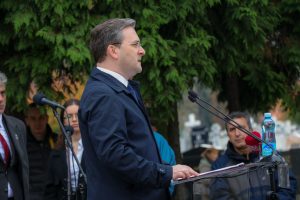The agreement on the establishment of close cooperation between the National Theatre from Belgrade, headed by Svetislav Bule Goncic and Cendra multimedia theatre from Pristina and director Jeton Neziri for the purpose of the alleged normalization of relations between the two countries is literally a knife in the back of Serbian national and state interests in the southern Serbian province.
It is noticeable the persistent efforts of the authorities from Pristina for cultural cooperation that should be an introduction to the so-called Kosovo. normalization in order to be followed by the recognition of the self-proclaimed Republic Of Kosovo by Belgrade, on which the US ambassadors Hovenier and Hill (from Pristina and Belgrade) insist. It is indicative that the director of the National Theatre from Belgrade interprets this agreement as an agreement between the two countries, which is contrary to the current Constitution of the Republic of Serbia because according to it Kosovo and Metohija is part of the territory of the Republic of Serbia.
The people's movement of Serbs from Kosovo and Metohija "fatherland" has nothing against calming the situation on the Belgrade-Pristina route, but to return 250 thousand expelled Serbs before then to normalize. That the Serbs return to all Kosovo cities, including the Serbian National Theatre from Pristina, to their city and then discuss cooperation.
It is symptomatic that after the collapse of the Mirdit venture-a good day that was supposed to be held in Belgrade, organized by the initiative for Human Rights, which was difficult for the American Ambassador Christopher Hill, there is a continuation of cooperation between the above factors, most likely according to the categorical instructions of the ambassador himself. It is certain that the director of the National Theatre without the blessing of the minister of culture Nikola Selakovic, and this one without his boss Aleksandar Vucic could not do such a thing. By the way, during more than 12 years of his rule, the president of Serbia never spoke about the return of 250 thousand expelled Serbs from their homes. To bring them back in his sleep did not fall.
In Pristina, within the Government of Albin Kurti, an institute was set up to deal with crimes committed by Serbia during 1999. over the Albanians. What a delusion and what a fraud. The number of Serbs and Albanians killed during those war years is about the same, and since the number of Serbs was five times smaller, then the real victims on the ground are Serbs and not Albanians. We remember only 16 members of the Kostić family from Rethymno near Orahovac or the fate of all Serbs from Leocina near Srbica who ended up in the so-called. the yellow house that only tells Who the real victims of violence during 1999 are. years.
It is simply amazing how the director of the National Theatre and the minister of culture have lost their minds that pogroms and violence are still being perpetrated against Serbs today. Serbs are being mass arrested for fabricated and executed war crimes whose main goal is never to return to their grandfather, Serbs are being brutally beaten primarily in the north by the Rosu police, and the chief of Selakovic and Goncic himself, Aleksandar Vucic, says that since the new year, more than two hundred brutal acts and violence have been committed against Serbs. Then how will we normalize in the future while the exodus and pogrom of Serbs lasts.

Photo By Nikola Selaković
If the Ministry of culture wants to do something at the national level, it must deal with the consequences of what has been happening to Serbs in the last two and a half decades. Serbs were expelled from the territory of the southern Serbian province from 427 settlements. In most of these settlements, their houses no longer exist, and cemeteries are razed and bones scattered on fertile Kosovo-Metohija land. Serbian cemeteries in the cities of Kosovo and Metohija resemble the twilight zone with demolished monuments and desecrated graves. A typical example is the cemetery in Kosovska Mitrovica. The Serbian Cemetery in Kosovska Mitrovica in the southern part of the city was demolished without a single entire monument, while the Albanian Cemetery in the northern part of Kosovska Mitrovica is intact. And where Albanians are buried to this day, unlike the Serbian one that no longer accepts the dead Serbs.
The Ministry of culture could also deal with the sufferings of Serbs during the past centuries at the hands of Albanians in the literature called Angry Arnauts or wild Arbanas. Let us only remember the words of the abbot of the Monastery of Decani Sava Barać, the later Serbian Bishop, who says for the 1840s that the time when the living envies the dead. It would not be worse for the minister of culture of the state of Serbia to read the consular letters of Serbian consuls with Kim at the time of the Turkish Empire and to understand the extent of pogrom, killing and persecution of Serbs that is no different from today. Unfortunately, but it is so, the Serbs did not suffer from the Turkish authorities at the time, but from Albanians who came from Albania took their land and committed crimes and violence against them along the way. Some even came as Catholics and then converted to Muslims because as Muslims in the time of Turkish rule they did not have to be held accountable for crimes against Serbs.
Albanians in 1999. it would be appropriate for the Ministry of culture to build a museum of the suffering of Serbs in Kosovo and Metohija that would cover the period for all these centuries after the migration of Serbs under Arsenije Čarnojević. It is the ministry's duty to do this precisely because of all the victims, killed, exiled, as well as all those bones that lie on the fertile Kosovo fields. Unfortunately, while this government is difficult to experience, which would be normal to build a museum of Serbian suffering.
The meeting of theatre workers of the National Theatre from Belgrade and Zendar Multimedia from Pristina, according to the statement of the organizers, should be around 29. November of the former Yugoslavia. That 29. November was not a holiday for all Serbs, but it is the 28th. November Albania day, i.e. Greater Albania, which theatre workers from Pristina should welcome in Belgrade.
In fact, we cannot expect anything else from this government. Having handed everything over and handed over to Pristina – institutions, facilities, the state has now decided through the Franco-German plan to normalize, i.e. and to recognize in action the self-proclaimed Republic Of Kosovo. To the truth, the president of Serbia says that he will never do that. Knowing him, we can't trust him. How many times has he lied to us over the years? And a lie more or less to this Serbian Baron Munich means nothing.
10. July 2024.

